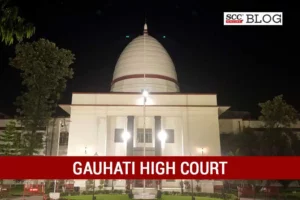Gauhati High Court: In a writ petition filed by the petitioner under Article 226 of the Constitution for the violation of his basic fundamental rights under Article 21 for handcuffing him without just cause, Devashis Baruah, J. observed that it is high time that Assam Police Manual is required to be amended in accordance with the law laid down by the Supreme Court in in Sunil Batra v. Delhi Administration, (1978) 4 SCC 494 and Prem Shankar Shukla v Delhi Administration, (1980) 3 SCC 526. The Court further observed in the case of Sunil Batra (supra) that bar fetters should be avoided as violative of human dignity, both within and without prisons.
Hence, the petition was allowed, and the Court held that respondent-State was liable to pay Rs 5 lakhs as compensation to the petitioner.
Background
In the instant case, an FIR was lodged on 05-10-2016 against the petitioner who was a law graduate enrolled with State Bar Council for manhandling a Home Guard of Assam Police, as the petitioner was not allowed to park his car near his house. The charges were framed against the petitioner under Sections 294/325/341/353 of the Penal Code, 1860 (“IPC”). The petitioner also filed a cross FIR against the Home Guard under Sections 294/323/392/511 of the IPC for verbally and physically abusing him and snatching his bag which contained Rs10,000.
The petitioner surrendered himself at the police station where he was detained and handcuffed. Further on 06-10-2016, he was produced before the Chief Judicial Magistrate and was under continuous handcuffed condition throughout his journey from the Court of Chief Judicial Magistrate to Central Jail, Guwahati.
Therefore, the petitioner being aggrieved by the act of the State, approached the Court by filing an instant writ petition for quashing the order and directing the respondents to pay adequate compensation for violating his fundamental rights by handcuffing him without any cause.
The respondents further contended that all necessary steps were taken according to the law when the petitioner was arrested and also charge sheet was submitted on the basis of the evidence and materials collected during the investigation.
Issues raised before the Court
1. Whether the petitioner who was arrested could have been handcuffed and if so, under what circumstances?
The Court relied on Sunil Batra (supra) and observed that ” the indiscriminate resort to handcuffs when accused persons are taken to and from Court and expedient of forcing irons on prison inmates were held to be illegal and should be stopped forthwith save in small category of cases where an undertrial has a credible tendency for violence and escape.” The Court further relied on Prem Shankar Shukla (supra) and observed that in extreme circumstances, handcuffs should be put on the prisoner and escorting authority must record the reasons for the same, otherwise the procedure would be unfair and bad in law.
Therefore, action of handcuffing by the respondents-was considered contrary to the law declared by the Supreme Court.
2. If there is any violation by the arresting officer, would the petitioner be entitled for the compensation and if so, to what amount?
The Court while contemplating on the said issue, relied on Nilabati Behera v State of Orrisa, (1993) 2 SCC 746, and observed that when public functionaries violate the fundamental rights under Art. 21 of the Constitution, they are held liable to compensate as a remedy because, it is their duty to protect and preserve the rights of the people of our society.
The Court further observed that in the light of the law laid down by the Supreme Court in the afore-stated cases, Rule 214 of Assam Police Manual has been rendered archaic.
The Court stated that parading the petitioner in handcuffs not only violated his fundamental rights but also demeaned his prestige and dignity to carry out his profession of advocacy. Hence no amount of compensation can restore the loss of prestige and indignity caused to the petitioner.
Under such circumstances, the Court considering the loss suffered by the petitioner, held the respondent-authorities are liable to compensate the petitioner within a period of two months for handcuffing him without any cause.
[Sabah Al Zarid v. State of Assam, 2023 SCC OnLine Gau 4244, decided on 20-12-2023]
*Judgement by Justice Devashis Baruah
Advocates who appeared in this case:
For the Petitioner: M. Biswas, Advocate
For the Respondent(s): H. Sarma, Advocate

